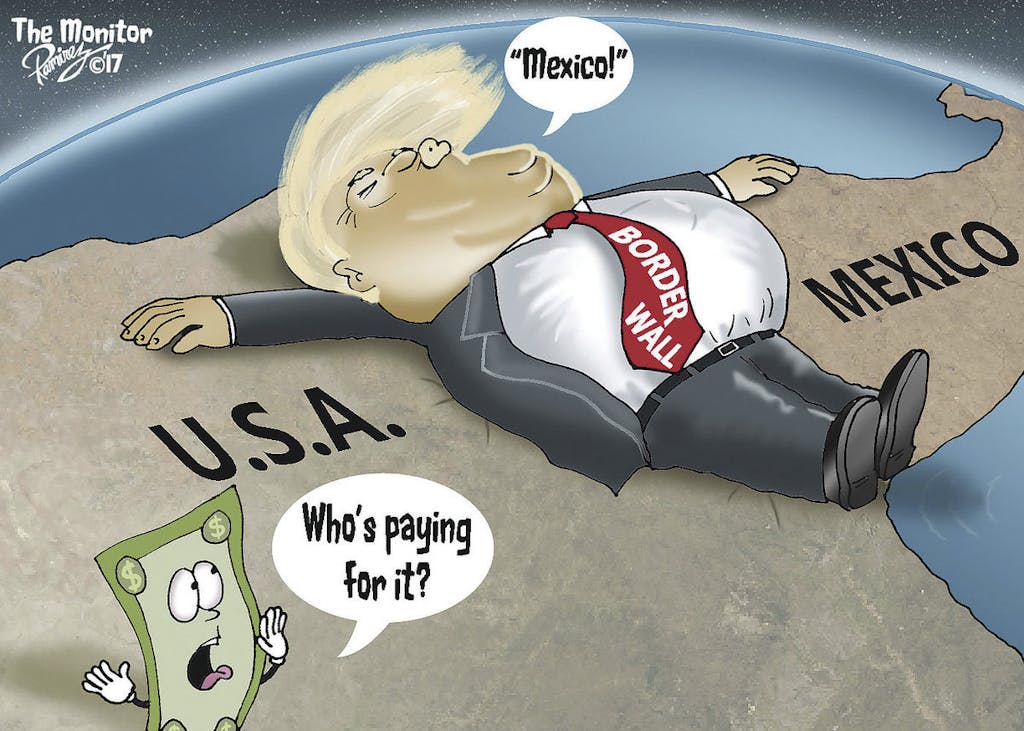Beyond here, there be dragons—or at least the most interesting articles I’ve read this week by other writers.

Presidential bluster and blunder – haste for a wall and trade war with Mexico loom
Editorial board, McAllen Monitor
In the first weeks of his presidential administration, Donald Trump threw out the Trans Pacific Partnership, said he will renegotiate the North American Free Trade Agreement, declared he will impose a 20-percent fee on imports from Mexico to pay for a border wall, and told Mexican President Enrique Peña Nieto that U.S. military forces will handle “bad hombres down there” if the Mexican authorities don’t. Can we be surprised that the editorial board of the McAllen Monitor is nervous?
The power of democracy is the notion that those elected to office must constantly assess the impact of his or her actions in relation to the next election. This circumspection benefits us all because public policy decisions are weighed and the full impact of those decisions are considered before the policy is implemented. But as the Monitor notes:
But President Trump seems not to consider such implications. It may reflect his own sense of certitude, but the potential for collateral damage is too great.
Take the case of the border wall and what it has already done with our relationship with Mexico — a relationship that has a direct impact on the Rio Grande Valley.
It’s shades of J.J. “Black Jack” Pershing going after Pancho Villa in 1916 and 1917 during the Mexican Revolution. After Villa’s forces attacked Columbus, New Mexico, and , Pershing invaded Mexico on the orders of President Woodrow Wilson in pursuit of Villa’s army. Pershing defeated the irregulars, but Villa escaped. The U.S. troops were forced to withdraw when the Mexican government threatened to use its own army against Pershing.
It’s Time for Texas Leaders to Defend NAFTA
Editorial board, Tyler Morning Telegraph
So maybe it’s no surprise that a border newspaper like the Monitor is worried by Trump’s policies on trade, but go north to Tyler, a city that is just about as Republican as you can get in Texas. The Tyler Morning Telegraph notes that a new NAFTA could disrupt sectors of the U.S. economy:
And that would be disastrous for Texas. Texas companies, big and small, export a total of $92.5 billion worth of goods to Mexico each year. That figure dwarfs second-place California, which exports just $26.8 billion of goods…
It’s time for the Texas delegation to Washington to stand up and say they won’t support Trump’s short-sighted attempts to kill NAFTA. Ditching NAFTA would be a mistake.
Is their congressman, Republican Louie Gohmert, listening?
Minority Leadership in Dallas is Changing
By Jim Schutze, Dallas Observer
A lot of journalists can tell you what happened, but more rare is the one who can tell you what is happening. The Observer’s Jim Schutze is among those with an eye on the trends, and he tells us here about a generational change in Dallas’ African-American political community:
Dallas County Commissioner John Wiley Price, scheduled to go on trial later this month on federal corruption charges, is still king of the city’s old black protesters. But the old black protest machine’s days as a major political force in the city probably are numbered anyway, no matter which way the judge’s gavel falls.
One indicator closely watched by insiders was the selection this week of state Rep. Eric Johnson of District 100 in West Dallas, South Dallas and parts of East Dallas, to head the Dallas Democratic legislative delegation during this year’s session of the Legislature, replacing Rep. Helen Giddings of District 109 in Cedar Hill, DeSoto and Lancaster.
There is one sentence in the story that reminded me of something I saw during the Democratic presidential primaries last year. While Hillary Clinton had the old guard of the civil rights movement, people who deserve honor, many of the young black intellectuals were throwing their support to Bernie Sanders. As Schutze says about the Dallas community: “If I had to come up with a one-sentence summary of the ones in that group whom I have met, I would say they are a little tired of hearing the old guard’s war stories and are very impatient for more substantive change.”
How to Live with Media Fatigue
By Christopher Mele, The New York Times
If you’re still reading, this may not apply to you. The other day on my Facebook feed, I asked whether President Trump’s rapid move from one crisis in the media to another was part of some plan to create protest fatigue early in his administration. But then someone else I know declared they were going to have to stop watching the news to save their sanity. This Times piece explores ways to deal with the shock and awe of our fast-moving media world in the age of Trump:
It feels as if we are living in a Superconducting Super Collider of news, with information bombarding us at a head-spinning velocity. The result is a fatigue about the headlines — lately about politics — that has prompted some people to withdraw from the news, or curb their consumption of it…
Experts said they had not seen data to conclude that consumers had changed their habits to protect their mental health, but added that the news ecosystem had changed drastically over the past five years, accelerating the sense of information overload.
Please, do some jumping jacks, a little meditation, yoga, and keep reading Texas Monthly.






